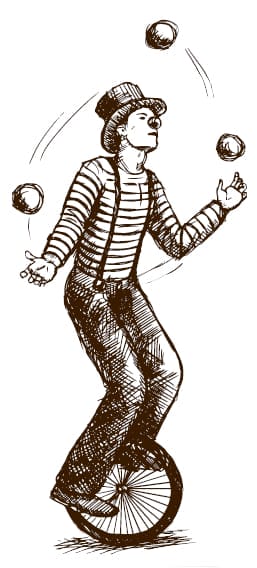If you like to think of yourself as a skilled multitasker, you have plenty of company, according to new research from Wharton marketing professor Rom Schrift, doctoral student Shalena Srna, and Yale professor Gal Zauberman. In their paper “The Illusion of Multitasking and Its Positive Effect on Performance,” the trio reveal some surprising truths about multitasking, including how we define it and how our perception of juggling multiple exercises shapes our performance.
The Premise
 of poll respondents in the study indicate that they multitask better than or as well as the average person. However, Schrift says, while multitasking is generally defined as engaging in multiple tasks at the same time, what we’re usually doing is switching rapidly back and forth between tasks. “This means multitasking is often nothing more than a perception or even an illusion.”
of poll respondents in the study indicate that they multitask better than or as well as the average person. However, Schrift says, while multitasking is generally defined as engaging in multiple tasks at the same time, what we’re usually doing is switching rapidly back and forth between tasks. “This means multitasking is often nothing more than a perception or even an illusion.”
The Question
How does the perception of multitasking affect performance?
An Experiment
 In one study, two groups were asked to transcribe a video clip—a job most people perceive as a single task. But in one group, researchers described the job as two simultaneous tasks: listening and typing. The “multitaskers” typed more words and showed better comprehension of what they’d typed.
In one study, two groups were asked to transcribe a video clip—a job most people perceive as a single task. But in one group, researchers described the job as two simultaneous tasks: listening and typing. The “multitaskers” typed more words and showed better comprehension of what they’d typed.
Two Surprising Conclusions
![]() Multitasking is in the eye of the multitasker. For instance: Is watching two football games on a split screen multitasking? What if one game is on an iPad? The answers, the researchers say, are a matter of “subjective perception.”
Multitasking is in the eye of the multitasker. For instance: Is watching two football games on a split screen multitasking? What if one game is on an iPad? The answers, the researchers say, are a matter of “subjective perception.”
![]() While other studies have shown that doing more than one thing hurts performance, this study shows that people who did multiple activities and perceived them as multitasking outperformed the people who perceived the same activities as single-tasking. In short? The mere perception of multitasking improves performance.
While other studies have shown that doing more than one thing hurts performance, this study shows that people who did multiple activities and perceived them as multitasking outperformed the people who perceived the same activities as single-tasking. In short? The mere perception of multitasking improves performance.
Workplace Implications
“Because almost any task may be decomposed to its smaller, more basic components,” Schrift says, “managers may find it useful to highlight the multitasking nature of the activity.”
Published as “The Multitasking Myth … And Why You Should Embrace It’” in the Spring/Summer 2018 issue of Wharton Magazine.

























